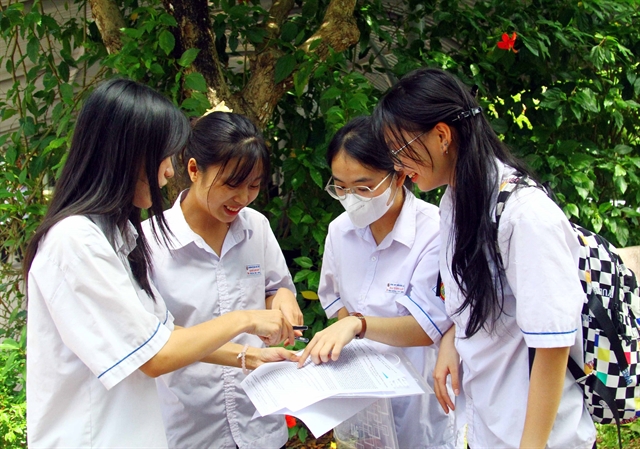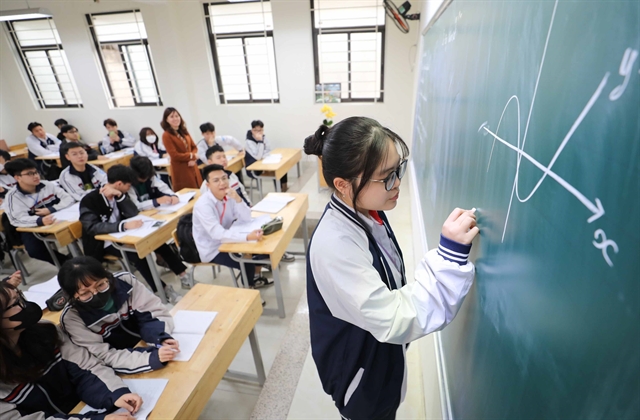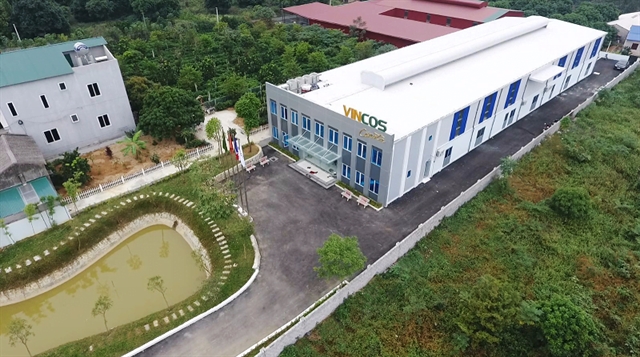 Society
Society

 |
| A school psychological counselling session for students. — Photo baochinhphu.vn |
HÀ NỘI — With the high school graduation exam just months away, students across Việt Nam are grappling with immense pressure from academic expectations, family aspirations and personal ambitions. The weight of these factors has led many to experience heightened stress, anxiety and even depression.
During this crucial period, stress management skills, along with strong support from parents and schools, play a vital role in helping students cope with stress and stay motivated.
The Ministry of Education and Training has officially announced that the high school graduation exam will take place from June 26-28, while entrance exams for Grade 10 in various provinces will begin in early June 2025.
The preparation period for these major exams is the most stressful time for students, as they juggle intense revision schedules and mounting expectations.
Adding to the academic pressure is the Ministry of Education and Training’s Circular No. 29/2024, which prohibits teachers from offering paid private tutoring to their students outside school. For many students, this change has significantly affected their exam preparation.
Mounting pressure
Ngọc Anh, a student at Marie Curie High School in Hà Nội, expressed her concerns about the regulation’s impact.
"The lessons in class only cover the basics and are not enough for thorough revision or achieving high scores in the graduation exam. I used to attend extra classes taught by my school teachers to reinforce my knowledge and prepare better."
However, with the new rule in place, many teachers have stopped offering extra lessons.
"I was already familiar with my teachers' styles of instruction, but now I have to find new tutors at the last minute. This change is disrupting my studies at a time when I need stability the most," she said.
For 12th-grade students, preparing for the graduation exam is not the only concern. Many are also required to sit for university competency assessments, which serve as an additional pathway for college admissions.
Vũ Phương Anh, a student at Trần Phú High School in Vĩnh Phúc Province, described the overwhelming pressure she has been facing since the start of the year.
"Since Lunar New Year, our school has organised multiple mock exams for final-year students. I am in the D1 track, and my scores vary significantly from last year’s university entrance benchmarks. Seeing this gap makes me incredibly anxious. My only solution is to keep practicing more and more exam papers. I have been studying so much that I have lost my appetite and struggle to sleep," she said.
According to Phương Anh, her situation is not unique.
"Many of my classmates feel the same way. Not only do we have to prepare for school mock exams, but we also need to take university competency tests to improve our chances of getting into a good college," she said.
Even securing a spot in these exams has become a stressful challenge.
"Registering for the competency test felt like a battlefield. I spent an entire morning trying to secure a test spot in Hà Nội but couldn’t get one. Now, I’ll have to travel to Thái Nguyên Province in mid-March just to take the exam," she added.
Overlapping exam schedules and the need to travel long distances for testing have left many students exhausted and overwhelmed.
 |
| 12th-grade students at Trương Định High School in Hoàng Mai District, Hà Nội, review for the high school graduation exam. VNA/VNS Photo Thanh Tùng |
Even those who have already secured university placements are not immune to the pressures of the graduation exam. Lê Ánh Tuyết, a national-level academic award winner and student at Vĩnh Phúc High School for Gifted Students, admitted that she is struggling to keep up.
"I spent three months preparing for the national competition, so now I am falling behind in my graduation exam subjects. I am struggling to catch up with my classmates and the imbalance makes me feel discouraged. Even though I have already secured direct admission to university through the ministry’s selection process, preparing for the high school graduation exam is still incredibly stressful," she said.
According to Dr Bạch Thị Mỹ Hà, a psychiatric resident at the Hà Nội-based Military Hospital, cases of anxiety disorders and other mental health issues have increased significantly in the lead-up to exam season.
"The main causes of this psychological strain stem from the immense pressure of achieving high scores, the fear of failing and the overwhelming challenge of choosing from hundreds of university majors," she explained.
Stress management skills
A recent study conducted by the Hà Nội National University of Education found that 57 per cent of students experience stress, particularly during their preparation for major exams. In severe cases, students have required hospitalisation due to prolonged psychological disorders, insomnia or physical exhaustion.
According to clinical psychologist Đặng Đức Anh, the impact of stress varies among individuals, influencing whether it leads to positive results or harmful consequences.
"Stress, when kept at a moderate level, can actually enhance focus and improve performance. However, excessive stress can have serious negative effects. The key is to address sources of tension as early as possible to prevent long-term accumulation," he said.
 |
| Teacher Hà Ánh Phượng with students at Hương Cần High School in Thanh Sơn District, Phú Thọ Province. Support from schools and teachers plays a vital role in helping students cope with stress and stay motivated. VNA/VNS Photo Trung Kiên |
He also highlighted several fundamental stress management techniques that can be applied in high-pressure situations, including positive self-talk, visualisation of a peaceful place, muscle relaxation exercises, mindfulness practices, seeking support from others or journaling for emotional release.
"These skills should be developed early, practised consistently and maintained over time to maximise their effectiveness," he added.
Dr Hà said the collaboration between families and schools plays a vital role in supporting students through this challenging period. Regular communication between parents, teachers and school counsellors is essential in identifying students' emotional states and providing timely assistance.
"Families should create a supportive and open environment where children feel comfortable sharing their thoughts and concerns. Parents should work with their children to resolve difficulties together," she said.
"Counselling centres and school psychology departments should organise workshops and educational sessions tailored to students' actual needs. These initiatives should be made widely accessible to all students while also offering targeted support to those experiencing difficulties," she added. — VNS




